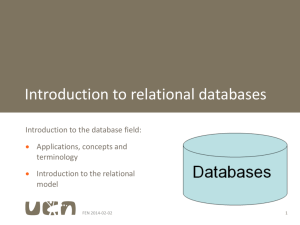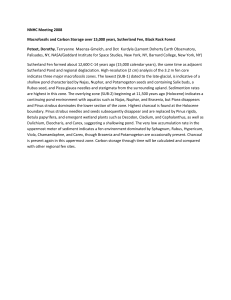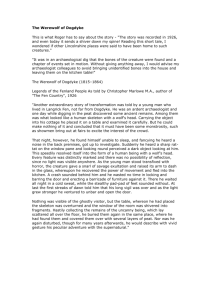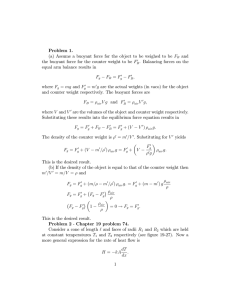Presentations\03RelModel
advertisement
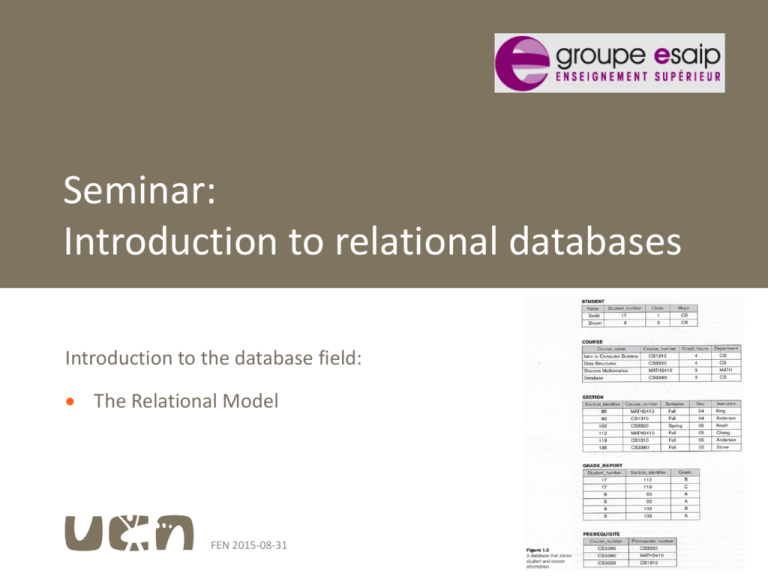
Seminar: Introduction to relational databases Introduction to the database field: The Relational Model FEN 2015-08-31 1 The Relational Model A sound theoretical data model (Codd, 1970). Based on the mathematical theory of relations, sets and first order predicate logic. De facto standard since the late eighties. Many-many implementations – most SQL-based. The Notorious Supplier-Part Database (Date) For instance: Oracle MySQL MS SQL Server PostgreSQL FEN 2015-08-31 2 The Relational Model: Concepts The Notorious Supplier-Part Database (Date) Central concepts: Tables (relations). Columns (attributes). Type (domain). Rows (tuples). Tuples are unordered. Tuples are unique. A relation is a set (mathematical) of tuples. Primary and foreign keys FEN 2015-08-31 3 The Relational Model Data is organised in a number of tables (relations). Each table has a number (>=1) columns (attributes). Attributes are atomic and defined over some domain. A table holds a number (maybe none) rows (tuples). Tuples are unordered. Tuples are unique (existence of a key is guaranteed). A relation is a set (mathematical) of tuples. FEN 2015-08-31 4 Attributes and Domains A domain defines the valid value of an attribute. Domains are based on the built-in standard data types (int, char etc.) offered by the DBMS. Theoretically it should be possible to define problem specific domains as account numbers, IP addresses etc. and complex aggregate (structured) domain as maps, diagrams, pictures, sound bites, video clips etc. More attributes may be defined over the same domain. An attribute may have the value “empty” (not known /not defined for this instance). Empty is notated NULL. FEN 2015-08-31 5 Properties of a Relation Follows from the fact that relations are (mathematically) sets: Tuples must be unique within a relation (hence a primary key always exists) Tuples are unordered (vertically) Attributes are unordered (horizontally) Attribute values are atomic Note the difference to the usual notion of a table FEN 2015-08-31 6 Keys A key is a combination of (one or more) attributes that is: Unique and Minimal An attribute combination that is unique, but not minimal is called a superkey The set of all attributes will always be a superkey, hence a superkey (and a key) always exists. A relation (table) may have several candidate keys. One these is appointed primary key. Any primary keys here? FEN 2015-08-31 7 Associations Between Relations Is represented by foreign keys. A foreign key is an attribute (combination) that corresponds to an attribute (combination) of the primary key of some other relation. A foreign key references a tuple in another relation and indicates that here is more information about the entity. Foreign key attributes and corresponding primary key attributes must be defined over compatible domains (or even the same domain). Any foreign keys here? FEN 2015-08-31 8 Integrity Constraints Domain constraints Attributes may only hold valid values Entity Integrity Primary key attributes may not hold NULL-values Referential Integrity (foreign key constraint) A foreign key must either be NULL or reference an existing primary key in the other relation Semantic Integrity Constraints depending on the problem domain Any constraints here? FEN 2015-08-31 9 Example: MiniBank Two tables: Customers Accounts Associated: An account belongs to one customer Association Any constraints here? (primary keys – foreign keys) FEN 2015-08-31 10 Example: MiniBank What happens if: We try to insert a customer with an existing custNo? We try to insert an account with a not existing custNo? Let’s try in MS SQL Server FEN 2015-08-31 11 Example: MiniBank Table definitions (schemas): Constraint FEN 2015-08-31 12 Quering a relational database Database Languages: Data Definition DDL Should provide constructs for defining all the previous (as “create table) Data Manipulation DML (queries, insert, delete, update) procedural (How?) nonprocedural (What?) The Relational Algebra is a procedural DML SQL includes a (sort of) nonprocedural DML FEN 2015-08-31 13 The Relational Algebra Data Manipulation in the Relational Model Operates on relations, which are input to the operations is tables and the result is a table Operations Row selection (RESTRICT/SELECT) Column selection (PROJECT) Combining tables (JOIN) Set operations (UNION, INTERSECTION, DIFFERENCE, PRODUCT) More advanced operations (OUTER (LEFT/RIGTH) JOIN) FEN 2015-08-31 14 Relational Algebra - Overview FEN 2015-08-31 15 Example: MiniBank Retrieve information about customer number 3: Row selection on custNo = 3 from Customer Retrieve account number, balance and customer number for accounts with a balance between 1000 and 2000: Row selection on 1000 <= balance and balance <= 2000 from Account Column selection on accNo, balance, custNo Retrieve information about customer Tommy and his accounts: Row selection on name = ‘Tommy’ from Customer Join with Account on custNo FEN 2015-08-31 16

